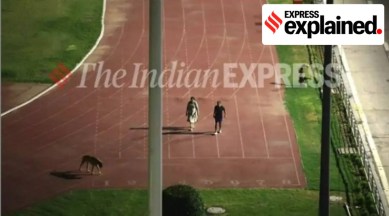Shyamlal Yadav is one of the pioneers of the effective use of RTI for investigative reporting. He is a member of the Investigative Team. His reporting on polluted rivers, foreign travel of public servants, MPs appointing relatives as assistants, fake journals, LIC’s lapsed policies, Honorary doctorates conferred to politicians and officials, Bank officials putting their own money into Jan Dhan accounts and more has made a huge impact. He is member of the International Consortium of Investigative Journalists (ICIJ). He has been part of global investigations like Paradise Papers, Fincen Files, Pandora Papers, Uber Files and Hidden Treasures. After his investigation in March 2023 the Metropolitan Museum of Art, New York returned 16 antiquities to India. Besides investigative work, he keeps writing on social and political issues. ... Read More
Explained: An IAS couple is transferred after dog-walking incident; what rules govern the conduct of senior Govt officers?
The overarching Rule for civil servants is: "Every member of the Service shall at all times maintain absolute integrity and devotion to duty and shall do nothing which is unbecoming of a member of the Service."

Senior IAS officer Sanjeev Khirwar and his wife Rinku Dugga, who is also a senior IAS officer, were transferred from their posts in Delhi to two different places this week, hours after The Indian Express published a picture of the couple along with their dog walking on the tracks of Thyagraj Stadium at a time when young athletes should have been practising on it.
The Indian Express reported that over the past few months, athletes training at the Delhi government stadium were being asked to leave early so that Khirwar, Delhi’s Principal Secretary (Revenue), could walk his dog there.
monthly limit of free stories.
with an Express account.
Buy Now | Our best subscription plan now has a special price
Days previously, The Indian Express had reported that Rajiv Bansal, Secretary, Ministry of Civil Aviation, had bought Economy Class tickets on Air India to fly to the United States with his wife on a personal visit at a rate that was far cheaper than what was paid by other passengers who had booked their seats on those same dates. Also, the couple was upgraded to Business Class on the flight.
On Saturday (May 28), Union Sports and Information and Broadcasting Minister Anurag Thakur described the Thyagraj Stadium incident as “very unfortunate”, and said the IAS couple had been transferred to “give a strong message”. “There should be rules and they should be followed,” the Minister said.
What rules govern the behaviour of high officials of the government?
The three All India Services (IAS, IPS, Indian Forest Service) are governed by the All India Service Conduct Rules, 1968. There are 23 Rules in all, which have been amended 37 times since they were first notified. The other civil services are governed by the Central Civil Services (CCS) Conduct Rules, 1964, which comprise 25 Rules which have seen 44 amendments so far.
The overarching Rule for civil servants is: “Every member of the Service shall at all times maintain absolute integrity and devotion to duty and shall do nothing which is unbecoming of a member of the Service.
“They shall maintain high ethical standards, integrity and honesty; political neutrality; accountability and transparency; responsiveness to the public, particularly to the weaker section; courtesy and good behaviour with the public.”
Do the Rules say anything about the general character and conduct of the officials?
By an amendment in August 2014, several points were added that may be seen as having a bearing on the conduct of the IAS officers in the recent cases. These include:
“Every member of the Service shall commit himself to and uphold the supremacy of the Constitution and democratic values; not misuse his position as civil servant and not take decisions in order to derive financial or material benefits for himself, his family or his friends; act with fairness and impartiality and not discriminate against anyone, particularly the poor and the under-privileged sections of society; refrain from doing anything which is or may be contrary to any law, rules, regulations and established practices”, among others things.
But officials sometimes claim their behaviour is dictated by orders of their superiors.
There is a well-framed Rule about how to act on oral orders given by superiors. It says, “The direction of the official superior shall ordinarily be in writing. Where the issue of oral direction becomes unavoidable, the official superior shall confirm it in writing immediately thereafter.
“A member of the Service who has received oral direction from his official superior shall seek confirmation of the same in writing, as early as possible.”
There are also a slew of other Rules relating to child labour, dowry, and marriages; securing employment for members of officers’ families; association with political parties and elections; receiving gifts; and expressing views and criticising the government in the media, etc.
How then do situations of violation of these Rules arise?
Many of these Rules continue to be violated frequently in big and small measure by officials. Departmental authorities, as well as the Vigilance set-up of governments, often fail to act against the violations — which has over time given rise to a culture of impunity and entitlement in a section of officers.
The spread of awareness among the public, the universal availability of camera phones, and the massive growth of social media have, however, served to put a check on some of these officials. In many places, government authorities have moved quickly to enforce accountability, reacting to media reports and public posts on social media.
Sources in the government said that the broad Rule against doing anything that is “unbecoming of a member of the Service” is often invoked to rein in errant officials.